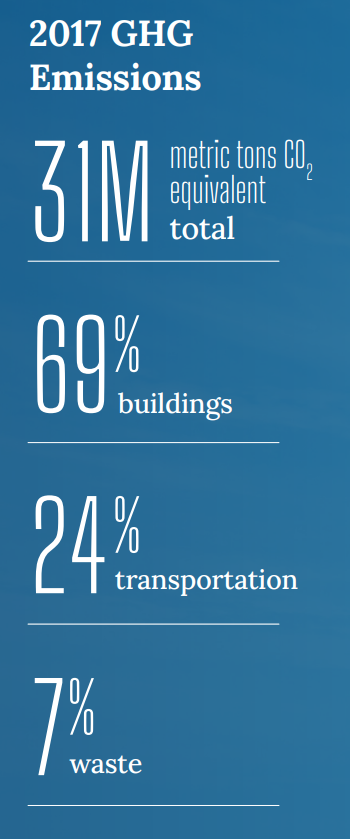Electrify Chicago
An independent tool for viewing City of Chicago building data
According to the
2022 Chicago Climate Action Plan,
69% of Chicago's emissions come from buildings, making
building emissions our biggest challenge and our biggest opportunity as a city
to tackle climate change. At Electrify Chicago, we showcase building performance using
publicly available data supplemented by community-submitted photographs and building
owners.
Start by looking at Chicago's buildings with the highest greenhouse gas intensity i.e. emissions per square foot. Large, efficient, buildings can perform much better than very inefficient small buildings on this metric.
New Article
📰 $30 Million In Missed Fines
The City Of Chicago failed to collect $30 million in potential fines from the building benchmarking ordinance, reducing transparency and accountability.
Legislative update! 🎉
As of late January 2024, legislation is being introduced to require new use more efficient forms of water and space heating, via the Clean And Affordable Buildings Ordinance (CABO), which will reduce the number of highly polluting and inefficient buildings that end up on this site.
If you're in Chicago,
write to your alderman to support the CABO!
Chicago Buildings by Greenhouse Gas Intensity
Note: Data includes large Chicago buildings with data from 2022, unless explicitly stated otherwise.
Note: This data only includes buildings whose emissions are reported
under the
Chicago Energy Benchmarking Ordinance. According to the City “As of 2016,
this list includes all commercial, institutional, and residential buildings larger than
50,000 square feet.” This dataset is also then filtered to only buildings with
reported emissions > 1,000 metric tons CO2 equivalent.
The latest year of data is from 2022, but we update the site regularly when new data is available, and some buildings may have failed to report that year, and only have older data available.
| Property Name / address | Primary Property Type |
Greenhouse Gas Intensity (kg CO2 eq./sqft) |
Total Greenhouse Emissions (metric tons CO2 eq.) |
|---|---|---|---|
|
5501 5525 N CHESTER AVE
5501 5525 N CHESTER AVE
| Multifamily Housing | 4.5 kg/sqft
Lowest 17%
| 270 tons
Lowest 6%
|
|
Westminster Condominium Association
🕰️
36 50 N MENARD AVE
| Multifamily Housing | 4.5 kg/sqft | 308 tons |
|
Little Village Plaza
🕰️
3045 - 3101 W. 26th St.
| Enclosed Mall | 4.5 kg/sqft | 327 tons |
|
Northpoint
🕰️
7717 North Paulina
| Multifamily Housing | 4.5 kg/sqft | 1,354 tons |
|
1010 W 35TH ST
1010 W 35TH ST
| Office | 4.5 kg/sqft
Lowest 17%
| 1,006 tons
Highest 45%
|
|
Metro
1200 W MONROE
| Multifamily Housing | 4.5 kg/sqft
Lowest 17%
| 1,266 tons
Highest 37%
|
|
828 W GRACE ST
828 W GRACE ST
| Multifamily Housing | 4.5 kg/sqft
Lowest 17%
| 987 tons
Highest 46%
|
|
Capitol Hill Lofts
625 631 W JACKSON BLVD
| Multifamily Housing | 4.5 kg/sqft
Lowest 17%
| 545 tons
Lowest 30%
|
|
British School
🕰️
814 W. Eastman
| K-12 School | 4.5 kg/sqft | 372 tons |
|
219 E Lake Shore CA
🕰️
219 227 E LAKE SHORE DR
| Multifamily Housing | 4.5 kg/sqft | 876 tons |
|
1115 S PLYMOUTH CT
1115 S PLYMOUTH CT
| Multifamily Housing | 4.5 kg/sqft
Lowest 17%
| 722 tons
Lowest 42%
|
|
1909 1935 S STATE ST
1909 1935 S STATE ST
| Multifamily Housing | 4.5 kg/sqft
Lowest 17%
| 386 tons
Lowest 16%
|
|
939 W HURON ST
939 W HURON ST
| Multifamily Housing | 4.5 kg/sqft
Lowest 17%
| 270 tons
Lowest 6%
|
|
640 W SHERIDAN RD
640 W SHERIDAN RD
| Multifamily Housing | 4.5 kg/sqft
Lowest 17%
| 272 tons
Lowest 6%
|
|
33 East Cedar Condominium Association
27 39 E CEDAR ST
| Multifamily Housing | 4.5 kg/sqft
Lowest 17%
| 725 tons
Lowest 42%
|
Data Source:
Chicago Energy Benchmarking Data
